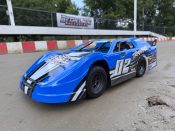It’s amazing what short course trucks have done to the racing scene. Not only is there a significant resurgence in racing, the short course craze has brought back many racers and elements of grass roots racing. Sure, at the track I have seen a lot of high-end big dollar trucks laying down ultra-fast lap times with highly skilled competitors driving as if their life depended on it. But then I see a whole other type of racer, the guy who is there to have fun, who is proud of their machine he is wheeling around the track. His truck may not have the best motor or new tires each run, or the latest setup with a freshly painted race body that look as fast as it drives. These guys at the track for fun caught my eye at a recent club race. I noticed a lot of Traxxas Slash 4×4’s seeding the heats and these trucks were taking a beating and coming back for more. A few of the trucks, although not driven by the best drivers there, appeared to be working really well. I knew the Slash 4×4 is race worthy, but seeing its potential and what it could take got this racer to thinking I wanted to try laying down fast laps with a Slash 4×4 of my own. So I set off to build my ideal club-race-ready Slash 4×4.
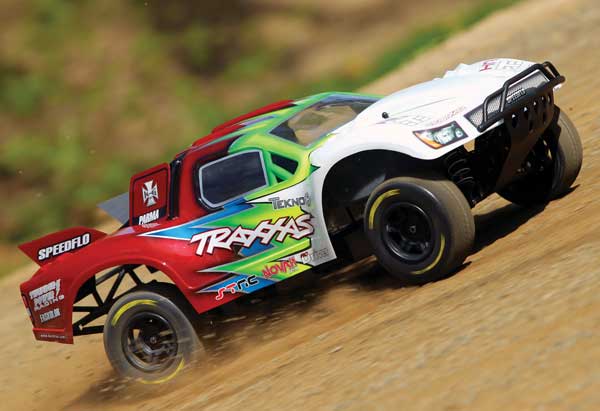
This build, like many of my recent builds, started as a ground-up parts build and not an already assembled kit that I would have to tear down. In going through some parts from a previous build, I found I had new stock front and rear bumpers, suspension arms, body mounts and steering bell-cranks with turnbuckles already installed. That meant I would be hunting down everything else needed for the truck and I could custom tailor this build with whatever race-ready accessories I wanted.
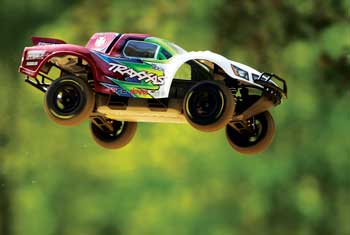
THE BUILD
For starters, I opted to go with a Traxxas LCG conversion set. This set gives you the chassis, nerf wings, front and rear suspension pivot/diff mount plates, battery mount with strap, motor mount, center diff support and gear cover along with all the hardware needed to install the parts. This is a good deal all-around for the start of a project or to convert an older, high CG S4x4. But even before installing any of the parts that came with the kit, I ordered an RC Screwz stainless steel screw kit specifically for this truck. This gave me almost all the hardware I needed, with the exception of axle pins, to build up my project as I went along. Before checking out, I also picked up their bearing kit for any bearings I would need along the way with the build.
When I was planning ahead, I determined I would need the front and rear differentials along with the cases. After a little hunting around, I found a good deal for the set online from a truck being parted out and had them shipped to my door for fifty bucks. A center diff was ordered from my local shop and this arrived at the same time. The first thing I did with these items was to tear them down, clean them out and fill the front diff with 10,000wt oil, the center with 20,000wt and the rear with 5,000wt. The drivetrain, however, was not complete. I needed the center prop shaft and I noticed Tekno RC offers a dogbone-style center kit with outdrive cups for the front and rear. This setup won’t bind while the chassis is twisting and turning during stresses and is a must have for a racer build. But that didn’t end my Tekno order. Tekno also offers a front and rear driveshaft kit. The front kit comes with new steering knuckles with steel CV type driveshafts and lightweight steel outdrive cups to mount to the diffs. The rear is similar but comes with .5 or 1.5 rear hubs. These axle upgrades prevent axles from bending or breaking and ride on larger diameter bearings for better durability. These would get installed later after I finished collecting the parts needed for completion.
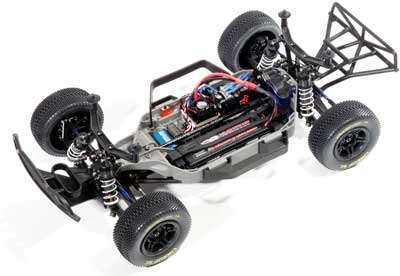
Next, I needed to start ordering suspension components and I turned to Hot Racing for their aluminum shock towers. The thick, black anodized shock towers come with shock posts for stock big bore shocks and they have a nice jeweled edge for a custom look. HR also offers trick looking aluminum caster blocks that mated up perfectly with the Tekno RC steering knuckles. As I mentioned before, I had the stock arms, but had to order up the pins, pin plates and new turnbuckles to complete the arm assemblies. This was the perfect time to order Traxxas blue anodized lightweight aluminum turnbuckles to reduce the sprung weight on the arms.
A Traxxas sway bar kit is a necessary item for this racer and this kit includes two different sizes of front and rear bars for tuning. Then it came down to making a decision on shocks. I see a lot of drivers using stock Losi TEN-SCTE shocks, but Traxxas recently released their GTR shocks for this truck, so I picked up a full set along with springs and filled them with 35wt oil before mounting them to the truck.
Some of my final purchases for the truck were a Hot Racing center diff support plate and their motor plate. The support plate features a much larger bearing than stock which will lessen the wear and tear on the bearing. The only other modification to the truck was an STRC carbon fiber ESC plate so I could mount my speedo to it later.
Assembling the truck was smooth and easy and I had the Traxxas exploded views loaded up to my computer so I could see where all of the screws from the RC Screwz kit were going. I did have to rework the shock mounting method for the top of the shocks as the included HR shock posts did not fit the GTR shocks. I simply used Axial racing spacers to space the shock out and retained the preinstalled GTR shock pivot ball. Another tweak was the battery strap. One tab on the strap hit the new HR center diff plate, so I cut off an eighth of an inch of plastic so the strap could be secured. Finally, I added one more O-ring to one of the Tekno center outdrive cups to cut down on the clanging of the shaft as it moves around.

In the electronics department, I decided to go full race and called the pros over at the orange electronics factory for a brand new Novak Pulse programmable speed control and a 4.5-turn hand wound 550-size motor. All I had to do was solder up the preinstalled wire to the motor, add a battery plug, and install the fan and the short ESC to receiver lead. The combo is a great package for any type of racer. For steering, I installed a ProTek RC high voltage 130S speed servo and the radio used to run this truck was a Spektrum DX3R Pro with SR3520 reciever. Finally, for power, Thunder Power’s 65C batteries are a racer’s favorite and I slipped one into this impressive machine.
Topping off the truck is a Parma Speedflo body painted with Faskolor paints by pro painter, Larry G, at Kustom RC Graphics. I bolted up premounted Duratrax Line Up SC tires at each corner for the indoor clay track I’d be running on.
OUT TO PLAY
When I first hit the track, I didn’t make more than a few laps before I hit the pits. My truck was making all sorts of noises I didn’t expect to hear and was actually rather embarrassing. The center Tekno shaft makes a lot of noise but was quieted with the simple addition of an extra O-ring in one outdrive cup to limit its movement. The other problem was a clicking noise from the pinion and spur area. I had used a generic pinion that was sitting in my toolbox; I don’t remember where it came from but figured it was the problem. I installed a Robinson Racing pinion and the mesh was now quiet. I knew I should have gone with a high quality gear like a Robinson from the start. Back on the track there weren’t any embarrassing sounds coming from my truck and I was able to concentrate on laying down some laps.
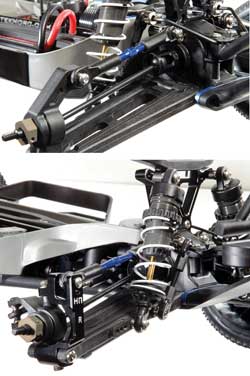
The first thing I noticed was the truck’s acceleration; the power combination of the Novak brushless system and punch from the Thunder Power battery was on-point for the drive system. Off the start, on the straights and out of corners, the tires would spin and bite and push the truck hard. I was also impressed with the nice, smooth feel of the Novak Pulse ESC, it made getting the power down on the tight indoor track much easier.
In the jumping department, I noticed the truck was much smoother compared to some of the stock trucks I saw running. The Project Slash 4X4 popped over the jumps and landed smoothly in contrast to the clunky slaps of a stock machine. The easy landings made it much easier to roll back on the throttle and resulted in quick lap times. Over the rough bumps and drop-offs, the truck soaked up any movement and the truck didn’t check up or get out of shape. Then, off the big jumps with lots of air, I was able to take off with a flat attitude and drop the nose if necessary for landings. I was impressed with how much control the truck had.
Finally, in the turns, the truck had plenty of off-power, low-speed steering to get the machine around the tight, slow corners with ease, but on power I noticed some push that held the truck back. I played around with tires and went to an AKA soft Gridiron to tighten up the cornering. Once I was happy with the tires, I did notice a little give in the stock steering servo saver assembly. Tightening the preload on the spring helped, but I think I’ll hunt down an aftermarket crank setup such as the one from Hot Racing. An adjustable servo saver assembly will let me crank down on the tension spring with an adjuster nut. It just wasn’t available at the time of my build or I would have already had it installed. With a bunch of packs run through the truck, I was really impressed with the performance and capability of the Slash 4×4. It’s considered “fun” truck by many, but it’s certainly capable of laying down fast laps on the racing scene.
THE LAST WORD
This is one of those times where I think building up a project from parts was a better deal than starting with a complete truck and tearing out the few parts I would use. Before attempting a similar project, I would recommend that you sit down and map out a plan and suggested parts pricing if you are doing an over-the-top project. However; if you do start with a stock truck, it’s best to modify a little at a time so you can enjoy what you’ve invested your money and time in. This Slash 4×4 LCG Racer project turned out to be a success since when it was done, I was left with a completely race capable machine that I can also have fun with outside the track.
PARTS LIST
DURATRAX
• Lineup SC Tire C2 Mounted Wheels/Tires- DTXC3679
HOT RACING
• Aluminum Front Shock Tower- SLF2801
• Aluminum Rear Shock Tower- SLF3001
• Black Aluminum C-hub (caster blocks)-SLF1901
• LCG Aluminum Motor Plate- LCF1801
• LCG Motor Mount with HD Bearing – LCF38X06
NOVAK RACING
• Novak Pulse/Vented Ballistic 4.5T 550 4xSC BL System – 3170
PARMA
• Speedflo SC Clear Body- 1237
PROTEK
• 130S Standard Digital “High Speed” Servo- PTK-130S
THUNDER POWER
• 5300mAh Pro Race 65C LiPo Pack- TP5300-2SPR65
TRAXXAS
• Differential Kit Center- 6814
• Sway Bar Kit- 6898
• Chassis Conversion Kit Low CG- 7421
• GTR Rear Shocks- 7462X
• GTR Front Shocks- 7461X
RC SCREWZ
• SS Screw Kit- tra039
• Bearing kit- tra039b
ROBINSON RACING
• 17T Pinion Gear Xtra Hard 5mm- 8717
SPEKTRUM
• DX3R PRO- SPM3200
TEKNO RC
• M6 Fr Driveshaft/Steering Block 6mm- TKR6851X
• M6 Rear Driveshaft/Hub Carriers 6mm- TKR6852X
• Big Bone Center Driveshaft and Outdrives- TKR6855
• 12mm Aluminum Hex Adapters- TKR1654X
Links
Duratrax, duratrax.com, 800.682.8948
Kustom RC Graphics, kustomrcgraphics.net
MaxAmps, maxamps.com, 888.654.4450
Parma, parmapse.com, 440.237.8650
ProTek, amainhobbies.com, 800.705.2215
RC Screwz, rcscrewz.com
Robinson Racing Products, robinsonracingproducts.com, 559.692.2465
Spektrum, spektrumrc.com, 800.338.4639
Tekno RC, teknorc.com, 877.857.2872
Thunder Power, thunderpowerrc.com, 702.228.8883
Traxxas, traxxas.com, 972.265.8000
Project: Greg Vogel
Photos: Walter Sidas
 RC Driver The Best In RC Car & Truck News, Reviews & Video
RC Driver The Best In RC Car & Truck News, Reviews & Video





